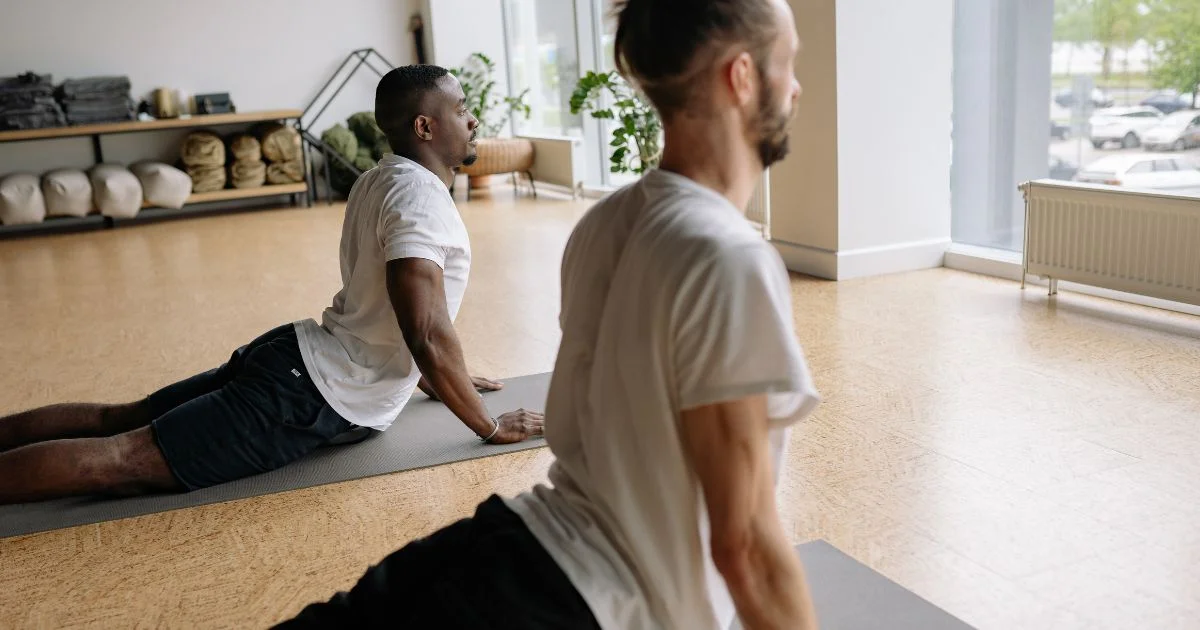Benefits of Yoga for Men
Yoga, an ancient practice that originated in India, has gained immense popularity worldwide for its holistic approach to well-being. While often associated with flexibility and meditation, yoga offers a myriad of benefits specifically tailored to men’s health and lifestyle. Beyond its physical aspects, yoga fosters mental clarity, emotional balance, and overall vitality, making it a comprehensive wellness tool for men of all ages. From improving strength and endurance to reducing stress and enhancing focus, the practice of yoga empowers men to achieve a harmonious synergy between mind, body, and soul, enabling them to lead healthier, more fulfilling lives.. In this blog post we will discuss 22 benefits of yoga for men.

22 benefits of yoga for men
Yoga has many benefits for both the mind and body. Here are 22 of the most commonly reported benefits of practicing yoga:
1.Improves flexibility: Practicing yoga postures regularly can help improve flexibility and range of motion in the muscles and joints.
2.Builds strength: Yoga postures also help to build strength in the muscles, which can improve overall physical performance and reduce the risk of injury.
3.Reduces Stress and anxiety: Yoga emphasizes deep breathing and relaxation techniques, which can help to reduce stress and anxiety and promote feelings of calm and relaxation.
also read..depresssion relieve stress management anxiety solution sleeping problem and solution weight loss Acro Yoga for Beginners: Embrace Balance and Trust with Ease
4.Improves sleep quality: The relaxation and meditation techniques used in yoga can also help to improve the quality of sleep.
5.Enhances mental clarity: Yoga can help to improve focus, concentration, and mental clarity, which can lead to improved productivity and overall well-being.
6.Lowers blood pressure: Studies have shown that regular yoga practice can help to lower blood pressure and reduce the risk of heart disease.
7.Improves balance: Many yoga postures require balance and coordination, which can help to improve overall balance and reduce the risk of falls.
8.Increases energy levels: Yoga can help to increase energy levels by improving circulation and oxygen flow to the body.
9.Boosts immune system: Yoga practice can help to boost the immune system, which can help to reduce the risk of illness and disease.
10.Reduces inflammation: Studies have shown that practicing yoga can help in reducing inflammation in the body, which is a major cause of many diseases.
11.Improves digestion: Yoga can help in improving digestion by stimulating the digestive system and reducing stress, which can affect digestion.
12.Promotes overall well-being: Yoga is a holistic practice that promotes overall physical, mental, and emotional well-being.
13.Enhances focus and concentration: The mindfulness and breathing techniques used in yoga can help in improving focus and concentration.
14.Improves posture: Yoga postures help in improving posture by aligning the spine and strengthening the muscles that support it.
15.Helps in weight management: Regular practice of yoga can help in maintaining a healthy weight by increasing metabolism and burning calories.
15.Reduces back pain: Yoga postures can help in reducing back pain by stretching and strengthening the muscles that support the spine.
16.Improves lung capacity: Pranayama or breathing exercises used in yoga can help in improving lung capacity and function.
17.Boosts self-esteem: The mindfulness and self-awareness promoted in yoga can help in boosting self-esteem and confidence.
18.Enhances creativity: Yoga practice can help in enhancing creativity by promoting relaxation and a clearer mind.
19.Promotes overall mental health: Yoga practice can help in promoting overall mental health by reducing symptoms of depression, anxiety, and other mental health conditions.
20.Improves joint health: Yoga postures can help in improving joint health by increasing flexibility, reducing inflammation, and promoting circulation.
21.Promotes inner peace: Yoga practice can help in promoting inner peace by reducing stress levels and promoting mindfulness and self-awareness.
22.Increases overall quality of life: Incorporating yoga into one’s daily routine can lead to a healthier and more balanced lifestyle, leading to an overall improvement in quality of life.
Conclusion
In conclusion, yoga offers numerous benefits for both the mind and body. From improving flexibility and strength to reducing stress and anxiety, regular practice of yoga can lead to a healthier and more balanced lifestyle. The practice of yoga also promotes self-awareness, mindfulness, and a deeper connection with oneself and the world around us. Overall, incorporating yoga into one’s daily routine can have a profound impact on overall well-being and quality of life.
Disclaimer: The benefits of yoga for men are based on general experiences and may vary from individual to individual. Before starting any new exercise regimen, it’s advisable to consult with a qualified healthcare professional, especially if you have any pre-existing health conditions or concerns.
FAQ
Why should people do yoga?
People should do yoga because it offers numerous physical and mental health benefits, including improved flexibility, strength, balance, stress reduction, and overall well-being. It can also promote mindfulness, self-awareness, and a deeper connection with oneself and the world around us.
What is the aim of the yoga?
The aim of yoga is to promote physical, mental, and spiritual well-being by integrating various practices such as physical postures (asanas), breathing techniques (pranayama), meditation, and ethical guidelines (yamas and niyamas). The ultimate goal of yoga is to achieve a state of unity between the individual self (atman) and the universal consciousness (Brahman).
What is most important in yoga?
In yoga, the most important aspect is the regular and consistent practice of various techniques, such as asanas (physical postures), pranayama (breathing techniques), meditation, and ethical guidelines. These practices help to promote physical, mental, and spiritual well-being and cultivate mindfulness, self-awareness, and inner peace. It is important to approach yoga with a spirit of openness, patience, and non-judgment, and to honor and respect the limitations and abilities of the body and mind.
Is yoga good for depression ?
Yes, yoga can be beneficial for depression. Studies have shown that regular yoga practice can help in reducing symptoms of depression, anxiety, and other mental health conditions. Yoga postures, breathing techniques, and meditation can help in reducing stress, improving mood, and promoting relaxation. Yoga can also increase levels of certain neurotransmitters such as dopamine and serotonin, which can have positive effects on mental health. However, it is important to consult with a healthcare professional before starting a yoga practice or using it as a treatment for depression.
Can yoga control overthinking ?
Yes, yoga can help in controlling overthinking. The practice of yoga involves focusing on the breath, body, and present moment, which can help in reducing the chatter of the mind and promoting mental calmness. Certain yoga postures, such as forward folds and inversions, can also help in calming the mind and reducing mental chatter. Breathing techniques used in yoga, such as deep breathing and alternate nostril breathing, can also help in promoting mental calmness and reducing overthinking. With regular practice, yoga can help in cultivating mindfulness and self-awareness, which can further help in reducing overthinking and promoting mental clarity.
Can yoga stop panic attack?
Yoga can be helpful in managing and preventing panic attacks. Yoga postures, breathing techniques, and meditation can help in reducing stress and anxiety levels, which are common triggers for panic attacks. Certain yoga postures, such as gentle twists and backbends, can also help in opening up the chest and promoting deep breathing, which can help in reducing feelings of panic and promoting relaxation. Additionally, regular yoga practice can help in cultivating mindfulness and self-awareness, which can help in recognizing and managing the early signs of a panic attack. However, it is important to consult with a healthcare professional before starting a yoga practice or using it as a treatment for panic attacks.



